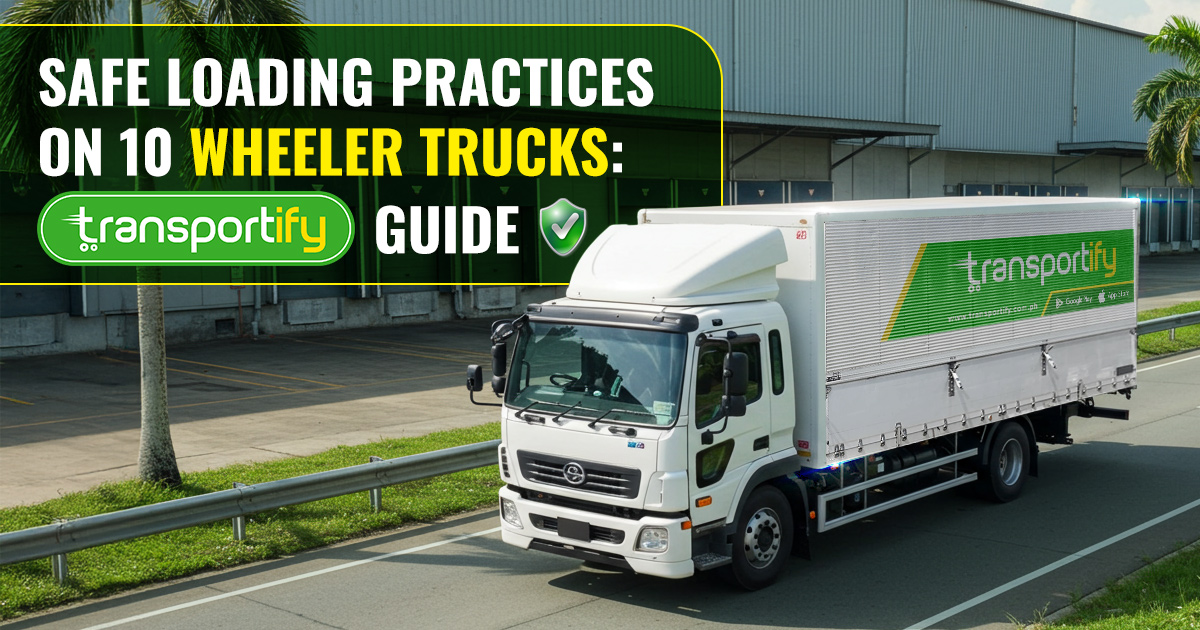
Transportify is a digital on demand delivery platform providing logistics solutions, following guidelines on safe loading practices for 10-wheeler trucks. Such loading guide is essential to maintain vehicle stability and prevent cargo damage. Given the size and complexity of these vehicles, improper loading can cause severe accidents, leading to financial and productivity losses.
Findings by the Metro Manila Development Authority’s (MMDA) Accident Reporting and Analysis System revealed that inadequate cargo securement from truck accidents is 15.33% of total road accidents in 2019. Consequently, the importance of these practices becomes evident in promoting safety, preventing property damage, and ensuring efficient goods transport. This blog addresses the need for comprehensive understanding and implementation of safe loading techniques to ensure smoother logistics operations and accident prevention.
What are Safe Loading Practices for 10 Wheeler Trucks?
The term safe loading practices refers to systematic approaches taken to ensure the secure placement of goods and materials on transport vehicles, particularly heavy freigh trucks such as 10-wheelers.
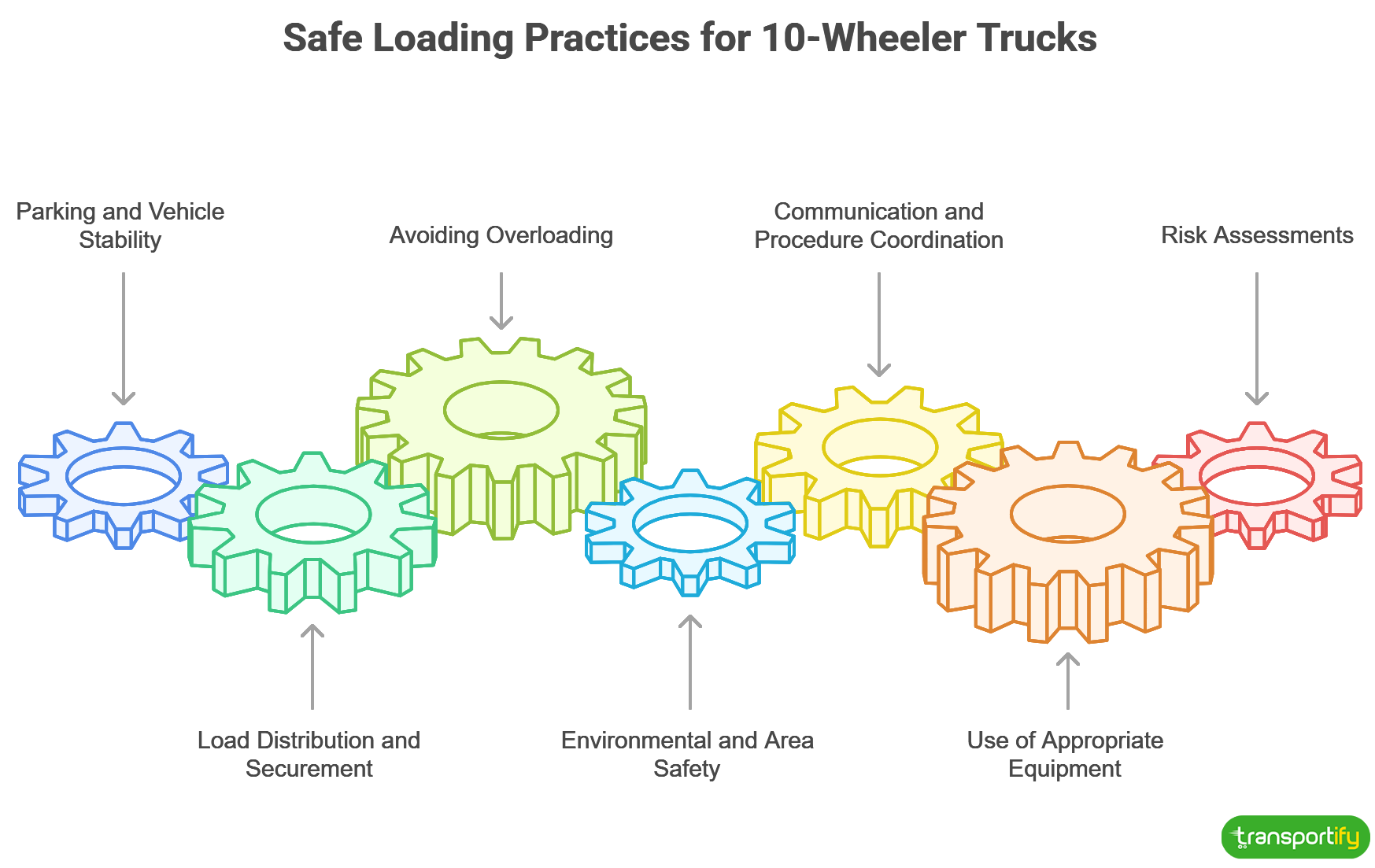
Key practices of safe loading include:
Parking and Vehicle Stability
Always park 10 wheeler trucks on level, firm ground before loading or unloading. Ensure that the vehicle’s brakes are properly applied, stabilisers are engaged, and the engine is turned off with keys removed to prevent unintended movement. Transportify has its drivers undergo trainings so anything that would ensure vehicle and road safety are well-translated to the driver.
Load Distribution and Securement
Spread loads evenly across the vehicle to maintain stability and prevent tipping. Loads should be secured close to the vehicle’s bulkhead with appropriate blocking or lashings to prevent shifting during transit. Using correct restraints like direct lashings for heavy machinery or frictional lashings over the load helps avoid accidents caused by movement. This is one of the expertise of Transportify, in equipping your delivery with tailored solutions based on you needs. Clients under Business Program can request for the equipment needed for lashing and blocking.
Avoiding Overloading
Overloaded vehicles become unstable, harder to steer, and have reduced braking ability. Never exceed the vehicle’s load capacity as this increases accident risk and can lead to regulatory penalties. Through Transportify app, your booking with specified cargo weight and dimensions will get the right vehicle to deliver it. You may also check in the table below the trucks and vans and their weight and dimensions limit per vehicle.
| Vehicle Type | Dimensions/ Weight Limits | Base Price (Metro Manila) | Base Price (Outside Metro Manila) | Base Price (Visayas/Mindanao) |
|---|---|---|---|---|
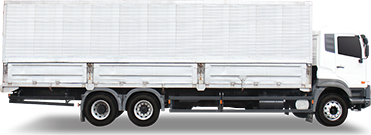 Wing Van Wing Van | 32 to 40 x 7.8 x 7.8 ft 12000kg to 28000kg | 7000 PHP | 6500 PHP | 6500 PHP |
| 18 x 6 x 7 ft 7000kg | 4850 PHP | 4850 PHP | 4850 PHP | |
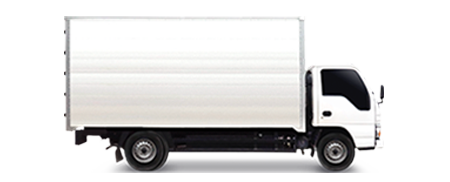 Closed Van Closed Van | 10 to 14 x 6 x 6 ft 2000kg to 4000kg | 1600 PHP | 1450 PHP | 1450 PHP |
 Open Truck Open Truck | 10 to 21 x 6 ft x open 2000kg and 7000kg | 2300 PHP | 1950 PHP | 1950 PHP |
 L300/Van L300/Van | 8 x 4.5 x 4.5 ft 1000kg | 415 PHP | 330 PHP | 310 PHP |
Environmental and Area Safety
The loading area should be clear of pedestrians and traffic, free from overhead obstructions like cables or pipes, and adequately segregated to prevent accidents. Installing barriers, well-marked pedestrian crossings, and one-way systems for vehicles reduces the chance of collisions.
Communication and Procedure Coordination
When multiple parties are involved in loading or unloading, it’s important to have clear communication and agreed procedures to ensure everyone’s safety. Information about the load, including how it is secured and unloading guide, should be provided to all involved personnel and drivers.
Use of Appropriate Equipment
Employ suitable lifting gear and loading systems to reduce manual handling risks. Automated loading solutions, such as roller tracks or moving floors, can enhance safety by minimizing the need for forklifts to enter 10 wheeler trucks, thereby reducing injury risk.
Risk Assessments
Conduct thorough risk assessments to identify hazards associated with the load type or environment—especially when handling hazardous materials such as chemicals—and implement appropriate control measures.
Unsafe loading is a major cause of workplace injuries, traffic accidents, and cargo damage. Proper adherence to these practices not only protects workers and drivers but also ensures compliance with legal safety requirements and reduces the likelihood of costly incidents.
Importance of Safe Loading Guide and Practices
Proper loading guide maintain vehicles like 10 wheeler trucks stability during transit and prevent cargo damage by ensuring weight distribution and securement.
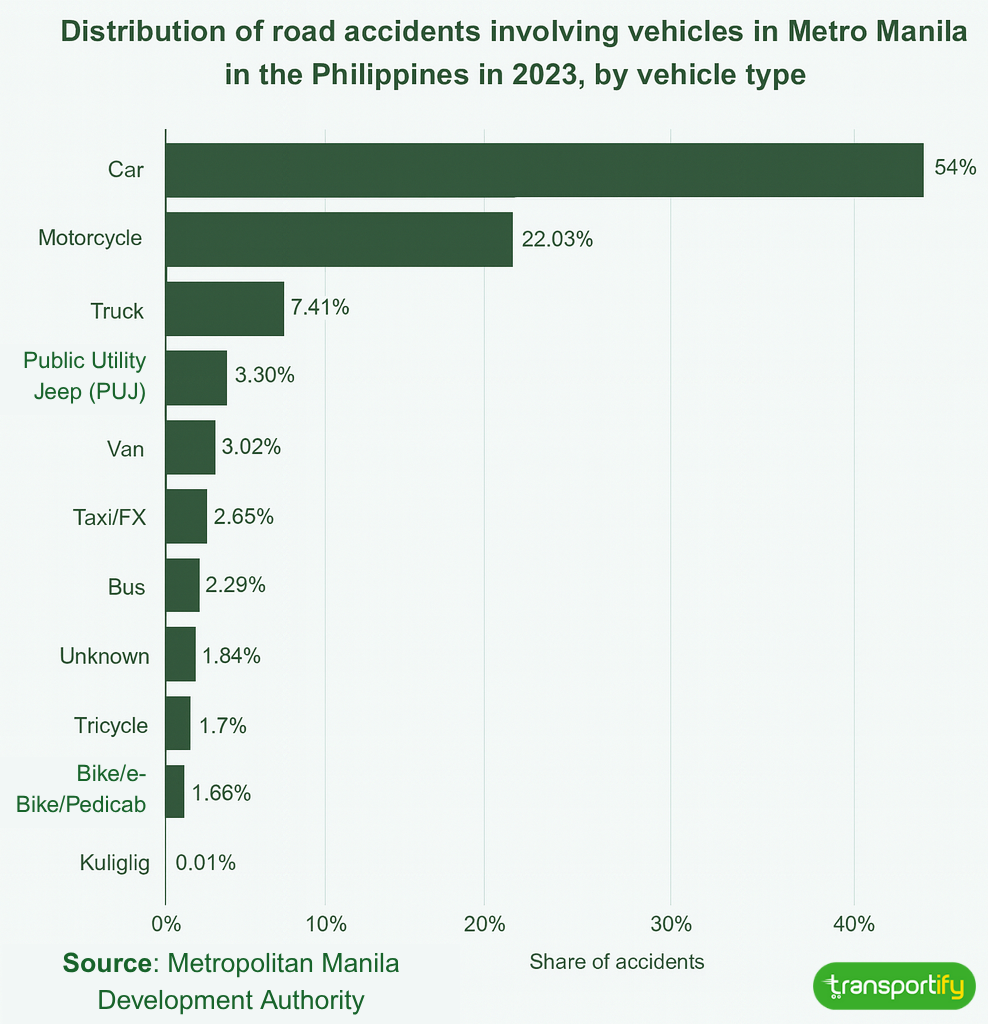
According to the Philippine Statistics Authority, in 2023 there were 13,101 fatalities on Philippine roads, with over 37,000 injuries. While not all accidents involve cargo trucks, which only corresponds to 7.41% of the totality, this still underscores the broader severity of road safety issues in the country.
Understanding the Risks
Improper loading can lead to various problems such as load shift, cargo spillage, tip-over accidents, and vehicle instability, all of which cause significant danger to both drivers and pedestrians.
Key Principles for Safe Truck Loading
How Much Load Can a 10-Wheeler Truck Legally Carry in the Philippines?
In the Philippines, a 10 wheeler truck is legally allowed to carry a maximum of 13,500 kilograms (13.5 tons) per axle. This translates to a total allowable gross vehicle weight (GVW) depending on the number of axles and their configuration. For a standard 10-wheeler with two axles, this would mean a maximum GVW of 27,000 kgs, or 27 tons.
Transportify has wing van trucks that can carry up tp 28 tons and a wing van typically has three axles, though variations exist depending on the specific configuration and load capacity.
How Does Transportify Ensure Safe Loading?
Transportify’s approach to safe loading involves rigorous training programs for drivers, strict compliance with regulations, and regular vehicle inspection.
- Training Programs
Transportify provides extensive training to its drivers on correct loading, securement, and weight distribution practices.
- Compliance to Regulations
Transportify adheres to international and local safety regulations. It follows the load limit, cargo distribution, and securement loading guide laid out by the respective road transport authorities.
- Frequent Vehicle Inspections
The company ensures fleet partner regular vehicle inspections to prevent any issues that may affect loading safety. These checks include tire pressure, suspensions, and brake systems, being pivotal elements that influence 10-wheeler trucks’ stability with heavy loads.
Recommended Safe Loading Practices for 10 Wheeler Trucks
Transfering our focus to specifically 10 wheeler trucks, we delve into the primary considerations for these vehicles, such as accurate load distribution, load securement, and height restrictions. Proper cargo securement can reduce shifting-load incidents, historically responsible for severe accidents.
Load Distribution
10-wheeler trucks feature multiple axels, therefore it requires skilled balancing of the cargo weight to optimize stability and handling. An unevenly distributed load can cause poor handling and even tip the vehicle over during sharp maneuvers.
Load Securement
Securing the load is essential to prevent it from shifting during transit. Essentially, it is recommended that every 2-3 hours or 150-200 km should conduct load checking due to frequent road conditions and traffic congestion in the Philippines, though official enforcement remains low.
Adhering to safe loading practices should be an inherent element of any logistics operation, especially those involving heavy vehicles like 10-wheel trucks. The importance of such measures is undeniable, they prevent accidents, improve efficiency, and ultimately contribute to a safer environment. Transportify’s commitment to safety prioritizes these practices, reflected in its rigorous driver training, adherence to regulations, and regular vehicle inspections.
Transitioning to understanding how these safe loading practices can be applied effectively on 10 wheeler trucks; from weight distribution to load securing, demonstrates the critical role they play in maintaining road safety and operational efficiency.
Download Transportify App and check for our 10 wheeler trucks now.
 | or |




 INSTANT QUOTE
INSTANT QUOTE

 Chat
Chat